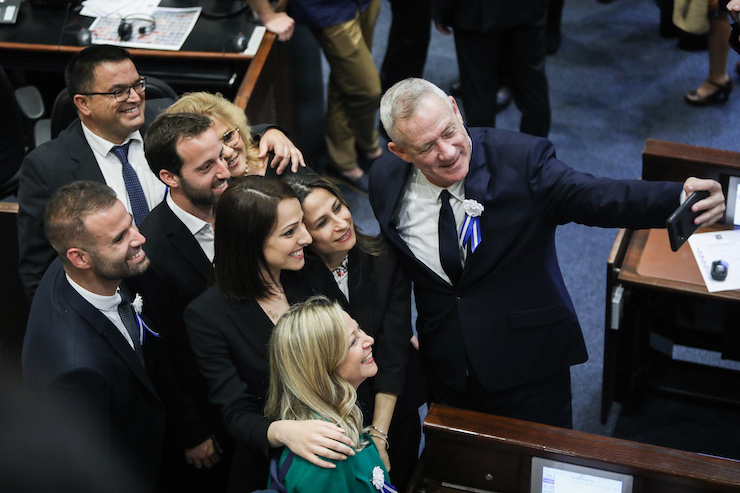Young Israeli lawmakers are arriving in parliament after an entire life in which Israel’s control over Palestinians is the natural state of the world.

No fewer than 49 new members of Knesset took their oath of office on Tuesday, in large part thanks to the dizzying success of the stand-for-nothing Blue and White party. The new Knesset boasts way fewer women and many more young members: 26 of the freshman class of parliamentarians are in their 30s. The youngest among them, Yorai Lahav Harzano of the Blue and White party, is 30.
In a normal world, perhaps that would be a source of hope. In our reality, however, young Israelis are more religious, conservative and right wing than their peers in the club of Western democratic states to which Israel claims to belong.
According to a new study on voting trends in Israel by Dr. Noa Lavi and Dr. Irit Adler from the Academic College of Tel Aviv-Yaffo, from 2008 to 2016, 64.3 percent of young Israelis between the ages of 18-29 voted for right-wing parties. In the 30-55 age group, only 54.9 percent voted for the same parties, compared to 57.3 percent among Israelis who were 56 years and older.
Just under half of the members of the 21st Knesset were born after June 1967, when Israel occupied Gaza and the West Bank, including East Jerusalem. Almost all the other members were either children or teenagers at that time.
Even if we set aside for a moment the questionable nature of Israel’s “democracy” in the years prior to the ’67 occupation, about half of Israeli lawmakers today have not known a single day without explicit apartheid —Israeli rule over an area in which two separate legal systems apply for two sets of people whose civic status is defined differently. Like their older colleagues, the younger members of Knesset have also not known a reality in which Arab citizens of Israel were perceived as citizens with equal rights rather than as a demographic threat. In all their years of education, it’s unlikely that they’ve come across a map of Israel that addresses the Green Line in any way. It is even less likely that even a few of them could draw the boundaries of occupation on a map.

What sort of democratic consciousness can develop in such a reality? The young members of Knesset are arriving at the gates of parliament after an entire life of political indoctrination in which Israel’s control of a Palestinian population is recognized as a fact of life, a kind of natural state of existence.
This is not to say that the veteran MKs are champions of democracy — far from it. But the latter shaped their political consciousness at a time when the current reality was considered an anomaly, and one worth confronting. There’s reason to doubt whether this conflict is present at all among the younger MKs. The old guard worked profusely to craft Israel’s current political consciousness, and the younger generations who were raised in this reality, reflect the depth to which this consciousness has successfully seeped into Israeli society.
In other words, when Benjamin Netanyahu uses rhetoric that ostracizes Palestinian citizens and explicitly incites against them, he is well aware of his manipulation. When new member of Knesset May Golan talks about citizens of the “Nation of Israel” as opposed to citizens of Israel, one can assume that this is not an attempt to manipulate but a serious and deep lack of understanding of basic democratic concepts. Not only is the concept of citizenship absent from her worldview, but also the idea of a political opposition. The reality of apartheid that Golan was bred in is dichotomous in nature; a consciousness of masters and subjects, winners and losers. It’s a destructive reality that produces destructive language, which produces a destructive political awareness.
This doesn’t mean that anyone born after the occupation supports it, or that those who were born before it oppose it. In any case, the apartheid regime that the ’67 occupation introduced is in many ways the natural continuation of the institutional discrimination that was rooted in this country’s system of governance since day one.
But the generations that were born and raised into a reality of apartheid in the occupied territories are required to acutely reconstruct the narrative that the establishment has drilled into their brains since the day they were born, according to which war crimes and daily human rights violations are merely a “political conflict.”
Those who were born and raised in a reality in which apartheid, in all its horrors, is the natural order of things, will need unusual strength just to understand the depth of the havoc Israel wreaks every day. Five decades of aggressive indoctrination make it impossible to even imagine a different reality that isn’t characterized by masters and subjects.
Whoever believes that a real change can come from the Knesset is blind to just how long the political pendulum in Israel has been derailed, and that it is only moving in one direction. It’s safe to guess that the future generation of Israeli politicians will have even fewer inhibitions and less of a basic understanding of democratic thinking. Their friends who were sworn in this week will do everything in their power to guarantee that.
Correction: A previous version of this article said that more than half of the members of Israel’s 21st Knesset were born after 1967. It is actually just under half.
This article was first published in Hebrew on Local Call. Read it here.

